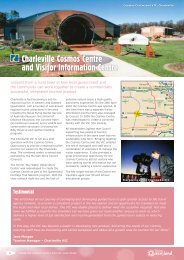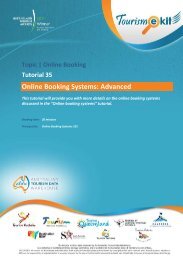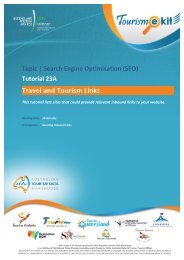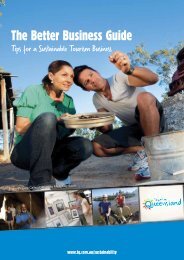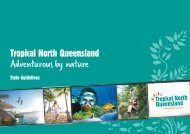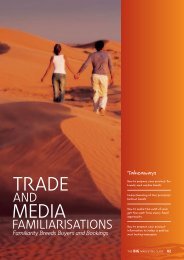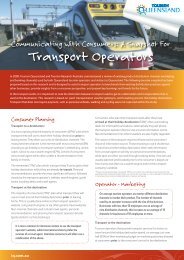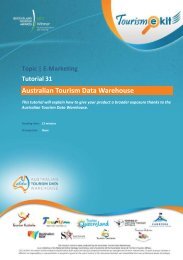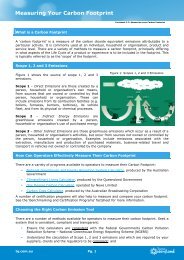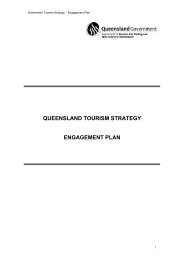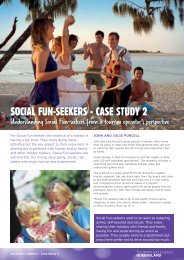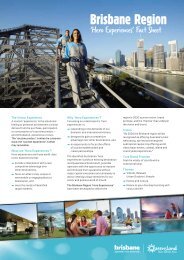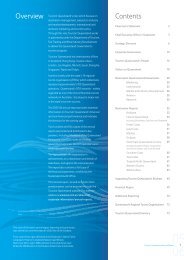QTS Chapter 2 - Introduction - Tourism Queensland
QTS Chapter 2 - Introduction - Tourism Queensland
QTS Chapter 2 - Introduction - Tourism Queensland
Create successful ePaper yourself
Turn your PDF publications into a flip-book with our unique Google optimized e-Paper software.
Policy and planning context<br />
Wherever possible, the <strong>Queensland</strong> <strong>Tourism</strong> Strategy Steering<br />
Committee has sought to develop strategies and actions that<br />
are consistent with, or can add value to, existing industry plans.<br />
The Strategy seeks to add value to and influence the following<br />
key policies:<br />
National context<br />
The <strong>Tourism</strong> White Paper, A Medium to Long Term Strategy<br />
for <strong>Tourism</strong>, details the Australian Government’s tourism policy<br />
and contains coordinated initiatives to ‘help better prepare the<br />
Australian tourism industry against future industry shocks by<br />
making it more robust, flexible and attuned to sustainability’. 7<br />
A <strong>Tourism</strong> Collaboration Intergovernmental Arrangement with<br />
state and territory governments provides a mechanism for<br />
implementation and coordination.<br />
Commonwealth<br />
Minister for Small Business and <strong>Tourism</strong><br />
Department of Industry<br />
<strong>Tourism</strong> and Resources<br />
Australian Government<br />
<strong>Tourism</strong> White Paper<br />
<strong>Tourism</strong> Collaboration<br />
Intergovernmental<br />
Arrangement<br />
<strong>Tourism</strong><br />
Ministers’<br />
Council<br />
Australian<br />
Standing<br />
Committee<br />
on <strong>Tourism</strong><br />
<strong>Tourism</strong><br />
Australia<br />
State context<br />
2 <strong>Introduction</strong><br />
The <strong>QTS</strong> will make a significant contribution to the following<br />
<strong>Queensland</strong> Government priorities:<br />
managing urban growth and building <strong>Queensland</strong>’s regions;<br />
protecting the environment for a sustainable future; and<br />
growing a diverse economy and creating jobs.<br />
The <strong>QTS</strong> Steering Committee has sought alignment with the<br />
broader objectives of the <strong>Queensland</strong> Government’s Smart<br />
State Strategy by ensuring that the <strong>QTS</strong> provides a policy<br />
direction for the tourism industry that is focused on the future,<br />
innovative and reflective of changes in technology.<br />
State<br />
Minister for <strong>Tourism</strong><br />
Department of <strong>Tourism</strong>,<br />
Fair Trading and Wine<br />
Industry Development<br />
<strong>Queensland</strong> <strong>Tourism</strong><br />
Strategy<br />
<strong>Tourism</strong><br />
<strong>Queensland</strong><br />
The <strong>Queensland</strong> Government, through the Growing <strong>Tourism</strong><br />
Strategy, recognised that tourism required coordination at all<br />
levels of government and across all government departments.<br />
In building on and replacing the Growing <strong>Tourism</strong> Strategy, the<br />
<strong>QTS</strong> extends the whole-of-government approach to provide<br />
both central and regional government coordination and<br />
effective industry engagement.<br />
Regional and local<br />
Regional <strong>Tourism</strong> Organisations<br />
Local <strong>Tourism</strong> Organisations /<br />
Local Government<br />
Destination Management Plans<br />
Destination Action Plans<br />
The Strategy aims to ensure that the tourism industry is<br />
consistently recognised in policy development across government<br />
and particularly in key planning documents such as the:<br />
<strong>Queensland</strong> Skills Plan;<br />
Education and Training Reforms for the Future;<br />
Regional Growth Management Frameworks such as the<br />
SEQ Regional Plan, the eight existing regional plans outside<br />
the SEQ region, and future regional plans;<br />
Blueprint for the Bush;<br />
<strong>Queensland</strong> Wine Industry Development Strategy;<br />
Partnerships <strong>Queensland</strong>;<br />
Roads Implementation Program;<br />
Community Engagement Improvement Strategy;<br />
<strong>Queensland</strong> Government Strategic Framework for Disability;<br />
Integrated Regional Transport Plans; and<br />
Shared Regional Economic Development Vision Statements<br />
developed under the Leading Smart Regions initiative.<br />
The <strong>QTS</strong> provides the framework to strengthen and capitalise<br />
on the linkages between the tourism structures and policies<br />
within Australia, as outlined in diagram 2.<br />
<strong>Tourism</strong> Industry<br />
Including tourism associations<br />
e.g. TTF, ATEC, QTIC etc.<br />
Diagram 2: Structure of tourism strategies and policies<br />
Regional context<br />
Destination management is a critical foundation for regional<br />
tourism planning and to be successful, requires a strong<br />
partnership between all stakeholders within the tourism network.<br />
This Strategy builds on the Destination Management Plans<br />
to reinforce the commitment to the destination management<br />
framework by creating a collaborative regional tourism planning<br />
mechanism. Theme one, Coordination, partnerships and<br />
community engagement, provides a detailed overview of<br />
the regional implementation process and network.<br />
7 Department of Industry, <strong>Tourism</strong> and Resources, The <strong>Tourism</strong> White Paper.<br />
12<br />
<strong>Queensland</strong> <strong>Tourism</strong> Strategy – November 2006



